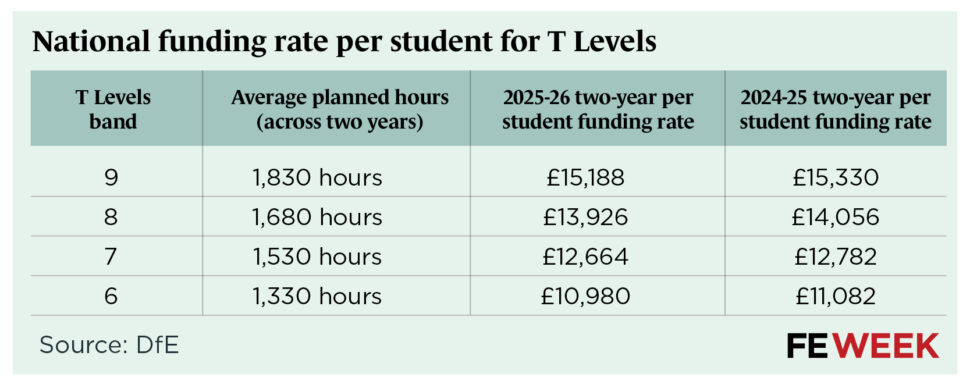The government should scrap level 2 apprenticeships and replace them with incoming foundation apprenticeships, a new report has said.
The call, which was floated to some extent by the Labour party while in opposition a decade ago, was put forward by Professor David Phoenix, vice-chancellor of London South Bank University, in a policy paper for the Higher Education Policy Institute (HEPI) today.
He argued that apprenticeships in their current form are encouraging employer investment in higher level skills at the expense of entry levels. And the “evidence suggests” that “many” level 2 apprenticeships have “not offered high-quality education and training, nor been sufficiently accessible to potential learners”.
He said that the government’s decision to introduce foundation apprenticeships, set to launch this autumn, “presents an opportunity to address the situation”.
“If foundation apprenticeships were to become a publicly-funded replacement of level 2 apprenticeships, they could potentially offer a high-quality and accessible route for learners to achieve essential qualifications alongside work experience,” Phoenix said.
This would also free up funding to make the proposed defunding of level 7 apprenticeships “unnecessary” and enable a “more strategic and nuanced approach to funding priorities”.
Labour announced foundation apprenticeships in September, describing them as an option that will “give young people a foot in the door” that will be backed with an initial £40 million from Treasury.
A government press release at the time said: “These new apprenticeships will give young people a route in to careers in critical sectors, enabling them to earn a wage whilst developing vital skills.”
Ministers have however failed to outline the exact detail of foundation apprenticeships since September, despite the introduction of the courses coming in a few months’ time.
Phoenix’s report pointed out that in 1993, the then Conservative government launched “modern apprenticeships” which required apprentices to work towards an NVQ (National Vocational Qualification) at level 3 as part of their programme.
These were supported by the creation of level 2 “national traineeships” – designed to provide progression routes into apprenticeship programmes for young people.
In response to the Richard Review in 2012, the previous government created the apprenticeship system as it is currently constituted, with apprenticeship standards from levels 2 to 7 set up by employer groups, and a levy for all UK employers with a pay bill of over £3 million per year (set at 0.5 per cent of a company’s annual wage bill), which can be recouped on apprenticeship training costs.
The Labour party, under then leader Ed Miliband, put forward a proposal in 2015 to scrap apprenticeships of less than two years’ duration and below level 3. A report by Labour’s Skills Taskforce at the time said: “To protect the apprenticeship brand, level 2 training should be renamed as a traineeship or similar.”
Phoenix’s paper highlighted plummeting starts at level 2 for apprenticeships, as well as cases of big-name employers like Halfords ending their in-house apprenticeship training at entry level.
Current Labour ministers have made no indication that foundation apprenticeships will replace level 2 apprenticeships.
Phoenix, who recently hired former Institute for Apprenticeships and Technical Education CEO Jennifer Coupland at LSBU, said the idea of foundation apprenticeships acting as “feeders into level 3 apprenticeships is a positive step forward and could provide a more cost and pedagogically effective route into level 3 and above”.
He said around £421 million of the apprenticeship levy budget is currently used on level 2 apprenticeships, and added: “While a swap to public funding may see the numbers of learners on these programmes increase, the cost of this could be offset by designing shorter and more focused programmes.
“The government has already taken a step in the right direction in this regard by reducing the minimum length of apprenticeships from 12 months to eight months.”
However, Simon Ashworth, deputy CEO at the Association of Employment and Learning Providers, warned that “switching out” level 2 apprenticeships for foundation apprenticeships would be a “mistake and would remove access routes and reduce opportunities for thousands of young people and adults”.
He said: “Let’s not give up on level 2 apprenticeships – there are promising developments coming. This includes the new business administration standard, reducing bureaucracy in the apprenticeship service, new shorter programme durations tailored to employer needs and adopting a more proportionate end-point assessment model. If deployed, the sums of these parts effectively could help revitalise level 2 apprenticeships.”
Ashworth added: “Foundation apprenticeships, targeted at young people and focused on key sectors, will have a big role to play in future. However, with nearly one million young people currently not in employment, education or training, the government’s opportunity mission can only be achieved by expanding, not narrowing, access to high-quality training routes.”
The DfE was approached for comment.







